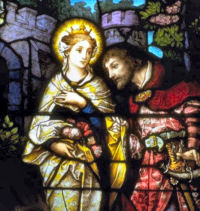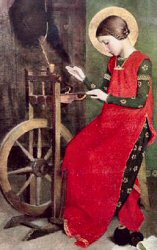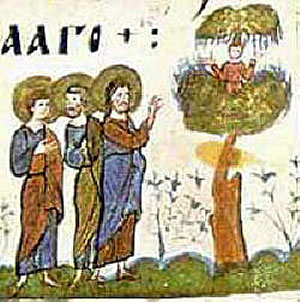Morning Prayer (Lauds)
If this is the first Hour that you are reciting today, you should precede it with the Invitatory Psalm.
O God, come to my aid.
O Lord, make haste to help me.
Glory be to the Father and to the Son and to the Holy Spirit,
as it was in the beginning, is now, and ever shall be,
world without end.
Amen. Alleluia.
A suitable hymn may be inserted here.
Psalm 23 (24)
The Lord comes to his temple |
Who will climb the mountain of the Lord? The one who is pure of heart and innocent of wrongdoing.
The Lord’s is the earth and its fullness,
the world and all who live in it.
He himself founded it upon the seas
and set it firm over the waters.
Who will climb the mountain of the Lord?
Who will stand in his holy place?
The one who is innocent of wrongdoing and pure of heart,
who has not given himself to vanities or sworn falsely.
He will receive the blessing of the Lord
and be justified by God his saviour.
This is the way of those who seek him,
seek the face of the God of Jacob.
Gates, raise your heads. Stand up, eternal doors,
and let the king of glory enter.
Who is the king of glory?
The Lord of might and power.
The Lord, strong in battle.
Gates, raise your heads. Stand up, eternal doors,
and let the king of glory enter.
Who is the king of glory?
The Lord of hosts
– he is the king of glory.
Glory be to the Father and to the Son and to the Holy Spirit,
as it was in the beginning, is now, and ever shall be,
world without end.
Amen.
Who will climb the mountain of the Lord? The one who is pure of heart and innocent of wrongdoing.
Exalt the King of eternity in everything you do.
Blessed be God who lives for ever,
whose kingdom is eternal:
for he both punishes and takes pity,
he leads down to the underworld,
and rescues from perdition;
no one can escape him.
Give thanks to him before all nations, children of Israel:
he scattered you among them,
and there he has made known his greatness.
Give glory to him before all who live:
he is our Lord, our father,
and our God for ever.
He will punish you for your transgressions;
but he will take pity on all your sufferings,
and gather you together from all the nations
among whom he scattered you.
If you turn back to him
with all your heart and soul
– if you keep faithful to him –
he will turn back to you
and hide his face no longer.
So now look at what he has done with you,
and praise him with all your might.
Bless the Lord of justice,
and glorify the eternal King.
In the land of my captivity I trust in him;
I show his power and majesty to the sinful people.
Turn back, sinners,
and be upright in his presence
– perhaps he will forgive you and show you his favour.
I will rejoice in the Lord with all my soul,
my soul will rejoice as long as it lives.
Bless the Lord, all his chosen ones:
all people, praise his greatness.
Fill your days with joy
and proclaim his glory.
Glory be to the Father and to the Son and to the Holy Spirit,
as it was in the beginning, is now, and ever shall be,
world without end.
Amen.
Exalt the King of eternity in everything you do.
Psalm 32 (33)
The Lord provides |
It is good for the upright to praise the Lord.
Rejoice in the Lord, you just:
it is good for the upright to praise him.
Proclaim the Lord on the lyre,
play his song on the ten-stringed harp.
Sing a new song to the Lord,
sing out your cries of triumph,
for the word of the Lord is truly just,
and all his actions are faithful.
The Lord loves justice and right judgement;
the earth is full of his loving kindness.
By the Lord’s word the heavens were made,
and all their array by the breath of his mouth.
He gathered the seas as if in a bag,
he stored up the depths in his treasury.
Let every land fear the Lord,
let all the world be awed at his presence.
For he spoke, and they came into being;
he commanded, and they were made.
The Lord confounds the counsel of the nations,
throws the thoughts of the peoples into confusion.
But the Lord’s own counsel stands firm for ever,
his thoughts last for all generations.
Happy the nation whose lord is God,
the people he has chosen as his inheritance.
The Lord looks down from the heavens
and sees all the children of men.
From his dwelling-place he looks
upon all who inhabit the earth.
He moulded each one of their hearts,
he understands all that they do.
The king will not be saved by his forces;
the abundance of his strength will not set the strong man free.
Do not trust a horse to save you,
whatever its swiftness and strength.
For see, the eyes of the Lord are on those who fear him,
upon those who trust in his mercy,
hoping he will save their souls from death
and their bodies from hunger.
Our souls praise the Lord,
for he is our help and our protector,
for our hearts rejoice in him,
and we trust in his holy name.
Lord, show us your loving kindness,
just as we put our hope in you.
Glory be to the Father and to the Son and to the Holy Spirit,
as it was in the beginning, is now, and ever shall be,
world without end.
Amen.
It is good for the upright to praise the Lord.
| Short reading |
Romans 13:11,12-13 © |
You must wake up now: the night is almost over, it will be daylight soon. Let us give up all the things we prefer to do under cover of the dark; let us arm ourselves and appear in the light. Let us live decently as people do in the daytime.
God is my helper and I will put my trust in him.
– God is my helper and I will put my trust in him.
He is my refuge and my liberator.
– God is my helper and I will put my trust in him.
Glory be to the Father and to the Son and to the Holy Spirit.
– God is my helper and I will put my trust in him.
| The Messiah and his forerunner |
The Lord has raised up the sign of salvation, as he promised through his prophets.
Blessed be the Lord, the God of Israel,
for he has come to his people and brought about their redemption.
He has raised up the sign of salvation
in the house of his servant David,
as he promised through the mouth of the holy ones,
his prophets through the ages:
to rescue us from our enemies
and all who hate us,
to take pity on our fathers,
to remember his holy covenant
and the oath he swore to Abraham our father,
that he would give himself to us,
that we could serve him without fear
– freed from the hands of our enemies –
in uprightness and holiness before him,
for all of our days.
And you, child, will be called the prophet of the Most High:
for you will go before the face of the Lord to prepare his path,
to let his people know their salvation,
so that their sins may be forgiven.
Through the bottomless mercy of our God,
one born on high will visit us
to give light to those who walk in darkness,
who live in the shadow of death;
to lead our feet in the path of peace.
Glory be to the Father and to the Son and to the Holy Spirit,
as it was in the beginning, is now, and ever shall be,
world without end.
Amen.
The Lord has raised up the sign of salvation, as he promised through his prophets.
| Prayers and Intercessions |
|
We are called to heaven, beloved brethren, so let us bless Jesus, high priest of our faith, and call on him:
– Lord, you are our God and our saviour.
Almighty King, through our baptism you have made us a royal priesthood:
may we offer you a constant sacrifice of praise.
– Lord, you are our God and our saviour.
Help us to keep your commandments
so that through the Holy Spirit we may dwell in you, and you in us.
– Lord, you are our God and our saviour.
Give us your eternal wisdom
so that it may be with us today and work with us.
– Lord, you are our God and our saviour.
Grant that today we may bring sadness to no-one
but on the contrary, give happiness to all we meet.
– Lord, you are our God and our saviour.
Our Father, who art in Heaven,
hallowed be thy name.
Thy kingdom come,
thy will be done on earth as it is in heaven.
Give us this day our daily bread,
and forgive us our trespasses
as we forgive those who trespass against us,
and lead us not into temptation,
but deliver us from evil.
Lord, look with favour on our morning prayers.
Brighten the inmost places of our hearts with your love so that no dark desires can hide there:
heal us with the light of your heavenly grace.
Through our Lord Jesus Christ, your Son,
who lives and reigns with you in the unity of the Holy Spirit,
God for ever and ever.
Amen.
May the Lord bless us and keep us from all harm; and may he lead us to eternal life.
A M E N

 17th
17th  After the early death of her husband (in 1227 while on a crusade led by Emperor Frederick II), Elizabeth laid aside all royal dignities in order to serve God more freely. She put on simple clothing, became a tertiary of St. Francis, and showed great patience and humility. Nor was she spared intense suffering -- the goods belonging to her as a widow were withheld, she was forced to leave Wartburg. In Eisenach no one dared receive her out of fear of her enemies. Upon much pleading a shepherd of the landgrave permitted her to use an abandoned pig sty. No one was allowed to visit or aid her; with her three children, of whom the youngest was not more than a few months old, she was forced to wander about in the winter's cold.
After the early death of her husband (in 1227 while on a crusade led by Emperor Frederick II), Elizabeth laid aside all royal dignities in order to serve God more freely. She put on simple clothing, became a tertiary of St. Francis, and showed great patience and humility. Nor was she spared intense suffering -- the goods belonging to her as a widow were withheld, she was forced to leave Wartburg. In Eisenach no one dared receive her out of fear of her enemies. Upon much pleading a shepherd of the landgrave permitted her to use an abandoned pig sty. No one was allowed to visit or aid her; with her three children, of whom the youngest was not more than a few months old, she was forced to wander about in the winter's cold. 
